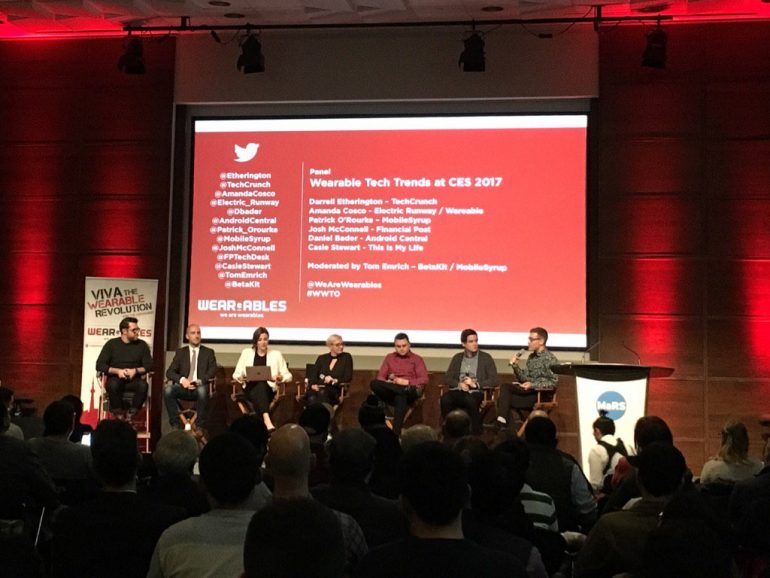For its first event of the year, We Are Wearables Toronto continued its annual tradition of inviting journalists to talk about wearable tech trends coming out of CES, which attracts 170,000 people from around the world each year.
Sitting with Darrell Etherington, a reporter at TechCrunch; Amanda Cosco, founder of Electric Runway; Patrick O’Rourke, senior editor at MobileSyrup; Josh McConnell, digital editor for the Financial Post’s Tech Desk; Daniel Bader, senior editor at MobileNations; and Casie Stewart, founder of This is My Life blog.
$36.6 billion by 2020 – #wearabletech Canadian market according to @idccanada #wwto pic.twitter.com/lKvH73XFq2
— We Are Wearables (@WeAreWearables) January 26, 2017
WWTO founder Tom Emrich asked the panelists if there was anything new about the show, or whether it was just “the same old” — an idea that the journalists came back to, as technology becomes a bigger part of our lives and it becomes more difficult to impress the everyday person.
“A lot of this hype is needed because it’s a platform for showcasing what the possibilities of the future, but to a certain extent, a lot of what happens in Vegas stays in Vegas,” said Cosco.
For some of the panelists, one of the biggest takeaways was how much technology would become integrated seamlessly into our everyday lives — especially when it comes to Amazon Alexa. While AirPods have started the new push towards hearables and integrations with Siri, Bader suggested that Alexa’s open platform will make it easier for people to embrace similar technology.
“I don’t think CES is going anywhere but I’ve seen a shift where it’s more about small companies.”
“AirPods integrate with Siri, but you’ll see Alexa increasingly integrated into everything that can be connected to a smartphone,” said Bader. “That is pushing the democratization of hearables — just by Amazon allowing anyone to plug into Alexa. We saw Alexa everywhere at CES it was in refrigerators, smartphones, and watches. I think it was in more places than anything else.”
McConnell agreed that the “story of CES” was Alexa. “It was just everywhere…that’s lit the fire in companies. Google will release their own device, and Apple has HomeKit. But those are not as present [as Alexa].”
Emrich asked if, in the next few years, CES will still be around. While O’Rourke agreed that it would, he said that the function of CES has changed since its inception.
“A lot of big mobile companies that make smartphones aren’t showing up anymore. And it’s the same thing that’s happening in the video game industry where they’d rather do their own events instead of having to compete for attention,” said O’Rourke. “I don’t think CES is going anywhere but I’ve seen a shift where it’s more about small companies.”
However, it’s these small companies that sometimes end up becoming leaders in their industry. InteraXon, the company behind the Muse, is a homegrown Toronto startup that became known worldwide for its meditation headband. The startup recently announced its partnership with Safilo, a global Italian eyewear brand, to develop smart, stylish sunglasses. Graeme Moffat, VP of scientific and regulatory affairs at Muse, showed off the Smith Lowdown Focus to the public for the first time.
.@smithoptics Lowdown Focus launches & Debuts #wwto cc @ChooseMuse @WeAreWearables pic.twitter.com/itDL3zYViQ
— Steve Fleck (@stevefleck) January 26, 2017
The Lowdown Focus is targeted to athletes, and is equipped with functions like an accelerometer, gyroscope, temperature gauge, and pressure sensors. “By training the brain, you improve athletic performance as much as physical training,” Moffat said.
“When Safilo approached us, we jumped at the opportunity to bring our tech into a form-factor that can reach more people and do more things, and we could push the envelope on it to bring new things to our users,” said Moffat, who stressed that the company was committed to staying in Toronto.
As this new product works to make Muse a bigger part of people’s routines, it speaks to a point that Cosco made during the panel about the CES tech strends she noticed.
“I’ve noticed increasing intimacy with digital technology. We’re inviting technology into our homes, and not just into just homes, but our bathrooms and fridges, just these tiniest little crevices of everyday life,” said Cosco.
Feature photo via Twitter

